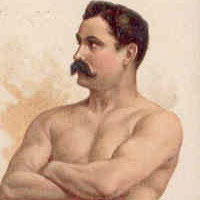Thiebaud Bauer bestreitet gearbeitete Matches 1876
Thiebaud oder Theobald Bauer war ein französischer Ringer, der sich auf griechisch-römisches Ringen spezialisierte. Bauer kam währenddessen in Amerika an 1875 mit einem zweifelhaften Anspruch auf die griechisch-römische Weltmeisterschaft im Schwergewichtsringen. Er würde seinen Titel verteidigen 5 Jahre bis zur Niederlage durch William Muldoon 1880. Wenn Wrestling-Fans Bauer überhaupt kennen, Es ist normalerweise, als der Gegner Muldoon den Weltmeistertitel beanspruchte.
Wrestling -Fans in den 1870er Jahren hätten sich eines weiteren Aspekts von Bauers Karriere bewusst gewesen. Er wurde häufig beschuldigt “Arbeiten” Streichhölzer. Bauer und seine Gegner würden einem Ergebnis vor dem Spiel zustimmen und in einer Ausstellung anstelle eines legitimen Wettbewerbs miteinander zusammenarbeiten. Während diese Praxis im größten Teil des 20. Jahrhunderts üblich war, Glücksspiel war ein großer Teil des professionellen Wrestlings des 19. Jahrhunderts. Fans verlieren Geld für einen “worked” Match war ein großes Problem und konnte den Sport beschädigen.

Künstlerwiedergabe von Theobaud Bauer, Griechisch-römischer Wrestler der 1870er und 1880er Jahre aus der Öffentlichkeit
Als Bauer in St. ankam. Louis für ein Match in 1876, Er wurde vom örtlichen Preisträger und ehemaligen Preiskämpfer Jack Looney entlarvt. Looney besaß eine örtliche Bar und half bei der arrangierenden Preiskämpfe auf den unbewohnten Inseln im Mississippi -Fluss.
Die Preiskampf war in den Vereinigten Staaten illegal. Die Planungskämpfe auf den Inseln haben dazu beigetragen, die möglicherweise in Ihrer Gerichtsbarkeit liegen oder nicht.
Ob aus einem Groll mit Bauer, Wer war ein häufiger Schutzpatronin bei den Preisträgern, Oder weil Looney keinen Wettbewerb um seine Preiskampfe wollte, Looney enthüllte die Praxis von Bauer im Mai 1876.
Es war eine übliche Praxis im professionellen Wrestling für beide Teilnehmer, aber ein Teil des Geldes, das dem anderen Wrestler vergeben würde, Wenn er das Match gewonnen hat. Zum Beispiel, Jeder Kandidat würde aufgestellt $300.00 eine Seite. Wenn Bauer gewonnen hat, Er würde einen höheren Prozentsatz der Gate -Einnahmen plus die erhalten $300.00 Seitenwette von seinem Gegner.
Looney sagte, es sei üblich, dass Bauer und sein Gegner ihre Seitenwetten ziehen, Stimmen Sie einem Ergebnis zu und teilen Sie dann gleichermaßen die Gate -Einnahmen auf. Looney beschuldigte sie nicht, Wetten über das Ergebnis des Spiels zu machen, aber es wäre leicht zu erkennen, wie sie sich auf diese Weise durch Proxy -Wetten bereichern könnten.
Bauer reagierte, indem er am Mai eine Herausforderung in der Lokalzeitung stellte 5, 1876 Looney jederzeit zu treffen, um ihre Unterschiede in einem Kampf beizulegen. 10 Jahre zuvor, Looney hat möglicherweise die Gelegenheit genutzt, Bauer zu treffen. Nearing 50 Jahre alt, Looney entschied.
Bauer kehrte nach St zurück. Louis im September 1876 Für das, was zweifellos ein Spiel mit dem häufigen Gegner William Miller war. Die Exposition vier Monate zuvor schien sich auf dieses Spiel nicht stark auswirken wie die ST. Louis Post-Dispatch nannte es “Bauer's Bonanza”. Auch im 19. Jahrhundert, Wrestling -Fans waren bereit, den Glauben auszusetzen, Wenn das Match interessant oder aufregend wäre.
Sie können unter oder auf meinem Kommentar Haben Sie Fragen zu diesem oder irgendeinem anderen Posten im Kommentarbereich hinterlassen Facebook page.
Sources: St. Louis Post-Dispatch, Mai 5, 1876 edition, p. 4 , September 27, 1876 edition, p. 4 und Oktober 2, 1876 edition, p. 4
Pin It
